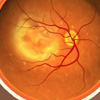Research on eye genes that cause or predispose individual to eye disease is a fast growing area which will probably find it’s way into your eye doctors office in the next 5-10 years. Most genetic tests are not perfect in the sense they are not diagnostic of an eye disease, but they frequently tell optometrists who may be more susceptible to acquiring the vision problem

Macular Degeneration-NEI
in the first place, or which individuals may be prone to more severe forms.
Almost 500 genes have been identified that contribute to diseases of the eyes. Mutations in the DNA associated with a number of eye diseases, including glaucoma, cataracts, strabismus, corneal dystrophies different types of retinal degeneration. Diseases thought to be untreatable in the not to distant past are now being targeted for future gene-based therapies.
Family members with relatives affected with genetic based eye diseases may want to know their risk factors and also for any future children. Unfortunately, testing is not readily available today, but the National Eye Institute is working to develop member labs to have this service readily available at some point in the future.
The program initiated to undertake this effort is referred to as the eyeGENETM program. It is a national progrma oordinating center, a centralized repository for blood/DNA/cell lines, several CLIA laboratories and a shared genotype / phenotype database. The goal of the NEI is to augment, not diminish, existing university-based and commercial ventures, while providing a new entry portal with rapid, reliable, and easy access to medical professionals.
Access to patient samples coupled to anonymous phenotypic data will augment the pace of ophthalmic genetics research, leading to improved medical decision making, clinical trials, and treatments for genetic eye diseases.